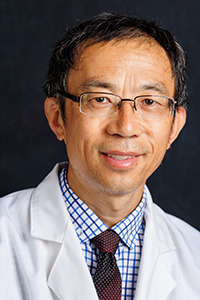
Associate Professor of Microbiology
Education
- PhD, Ohio University
- MM, Shanghai Medical University
- BM, Shandong Medical University
Biography
Dr. Liu served for four years as a physician in Jinan Infectious Diseases Hospital, specializing in clinical management of infectious diseases. Before joining LUCOM, he served for 11 years in Maranatha Baptist Bible College (now Maranatha Baptist University), where he taught diverse undergraduate courses including calculus physics, biochemistry, and molecular genetics.
Dr. Liu’s research focuses on human endogenous retroviruses (HERVs), especially HERV activities in breast cancer development. He is also interested in the implications of HERVs in the natural history of the human race.
Courses Taught
- Biomedical Foundations of Osteopathic Medicine (BFOM)
- Cardio/Pulmonology (CP)
- Cardiovascular Respiratory Hematologic System (CVRH)
- Endocrine and Reproductive Systems (ENDREP)
- Gastroenterology (GI)
- Gastrointestinal System and Nutrition (GINUTRI)
- Hematology/Oncology (HO)
- Integument and Musculoskeletal Systems (IMSK)
- Nephrology/Urology (NephUro)
- Neurology/Psychiatry/Opthalmology (NPO)
- Pediatrics (PEDS)
- Urinary System (URI)
- Pre-clinical Research
Professional Memberships
- Creation Biology Society
- Chinese Creation Science Association
- Logos Research Associates
Publications
- Liu, Y., Wen, Y., and Zhang, W. (1995) [Humoral and cellular immune responses against duck hepatitis B virus in its natural host.] Acta Academiae Medicinae Shandong 33(4): 298-301
- Liu, Y.and Wang, Y. (1997) [Hepatitis C infection through transfusion of screened plasma.] Chinese Journal of Nosocomiology 7:S179
- Liu, Y.and Biegalke, B. (2001) Characterization of a cluster of late genes of guinea pig Cytomegalovirus. Virus Genes 23(3): 247-256
- Liu, Y.and Biegalke, B. (2002) The human cytomegalovirus UL35 gene encodes two proteins with different functions. Journal of Virology 76(5): 2460-2468
- Liu, Y.and Moran, B. (2006) Do new functions arise by gene duplication. Journal of Creation 20(2): 82-89
- Liu, Y. (2006) Do new molecular functions arise by gene duplication? Occasional Papers of the BSG 8: 12
- Liu, Y. (2006) Were retroviruses created good? The Journal of Biblical and Scientific Studies http://www.answersingenesis.org/articles/am/v1/n2/were-retroviruses-created-good
- Liu, Y. (2008) Endogenous retroviruses: remnants of germline infection or created in the cell? Creation Research Society Quarterly 44(3): 241.
- Liu, Y. (2008) Book review: The regulatory genome: gene regulatory networks in development and evolution, by Eric H. Davidson.
- Liu, Y. (2008) The immunoglobulin heavy chain gene family and gene duplication. Journal of Creation 22(3): 18-20.
- Liu, Y. (2009) Did gene duplication produce gene families? Creation Research Society Quarterly 45(3):179-187.
- Loggans, L., Mudge, A., and Liu, Y. (2009) Transcription of Human Endogenous Retroviruses during the Menstrual Cycle. Occasional Papers of the BSG 13:5-6.
- Liu, Y and Soper, C. (2009) The Natural History of Retroviruses: Exogenization vs Endogenization. Answers Research Journal 2:97-106.
- Liu, Y. (2015) Cyclic selection in HIV–1 tropism: microevolution that is going nowhere. Answers Research Journal 8:199-202.
- Liu, Y. (2015) Mutations in the nef gene make HIV-1 more virulent. Answers Research Journal 8 333–336.
- Liu, Y. (2015) Is HIV-1 losing fitness due to genetic entropy? Answers Research Journal 8:339–351.
- Liu, Y. (2018) DNA barcodes show gaps between species and support recent common bottleneck. Journal of Creation 32(3):7-9.
- Mueller O, Moore DW, Giovannucci J, Etter AR, Peterson EM, Mudge A, and Liu Y. (2018) Expression of human endogenous retroviruses in peripheral leukocytes during the menstrual cycle suggests coordinated hormonal regulation. AIDS Research and Human Retroviruses 34:909-911.
- T.D., Davis, J, Eugenio, R.A., and Liu, Y. (2019) Female Sex Hormones Activate Human endogenous retrovirus type K through the OCT4 Transcription Factor in T47D Breast Cancer Cells. AIDS Research and Human Retroviruses 35:348-356.
Research Interests
- Physiological functions of human endogenous retroviruses
- Role of endogenous retroviruses in cancer development